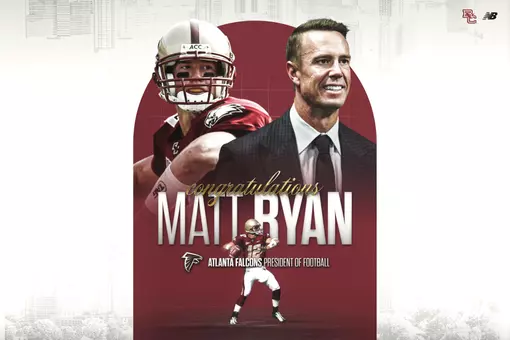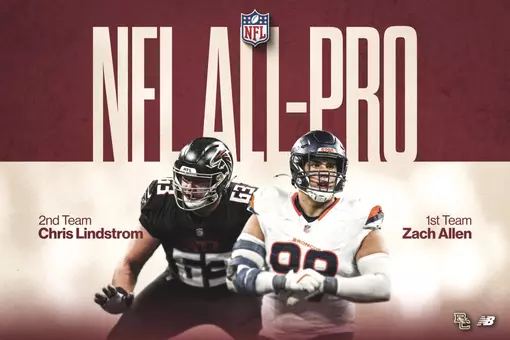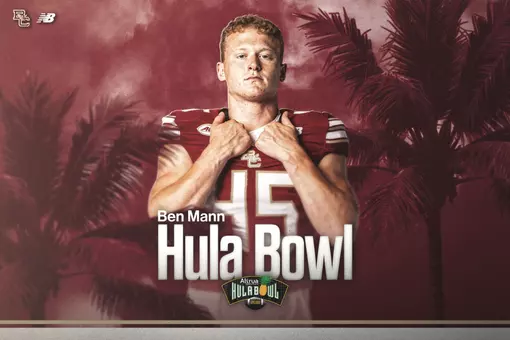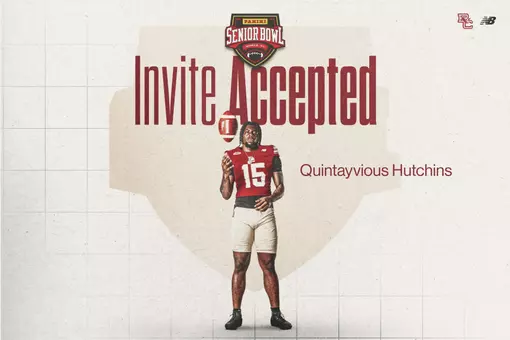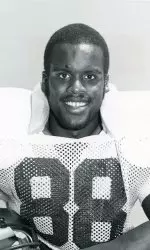
BC Athletics Remembers Russ Joyner
January 09, 2015 | Football
On New Year's Day, the Boston College Athletic community lost a cherished member in former football captain Russ Joyner '82. Former sports information director Reid Oslin `68 pays tribute to the BC standout.
When Boston College played Auburn in the 1982 Tangerine Bowl in Orlando, it marked the first time in nearly 40 years that the Eagles had been invited to play in a postseason game.
But college football followers everywhere knew that the renascent Eagles would not have an easy task in their long-overdue return to post-season play. Coach Pat Dye's Auburn Tigers, fresh off a victory over arch-rival Alabama, featured two of college football's top running backs - Lionel "Little Train" James and future Heisman Trophy winner Bo Jackson - in the same offensive backfield. Attempting to stop this speedy pair would take a supreme effort.
So Boston College's coaching staff asked co-captain Russ Joyner, a highly-skilled and selfless defensive end, to step in and take a new role.
"Russ was a great person, a great player and a great leader," recalled Kevin Lempa, who coached BC's defensive ends at the time. "He always did exactly what we asked him to do."
BC's gameplan was to have Joyner "close down" on Auburn's tight end, the lead blocker on the Tigers' famed power sweep play. The tactic, although seemingly taking the capable Joyner out of the play, would hopefully clear a path for BC's linebackers to have a better shot at corralling the fleet Auburn ball carriers.
"He did a lot more than `close down,'" Lempa added. "On most plays, he drove the tight end all the way back to the other side of the center."
The Eagles wound up losing the game to the heavily-favored Tigers by a single touchdown, but the BC defense - inspired by Joyner's constant disruptions - stonewalled two Auburn drives inside the BC five-yard line. In the end, BC's overlooked offense, led by sophomore sensation Doug Flutie, simply ran out of time.
Joyner's contributions in that game fell into the shadow of the offensive and defensive numbers amassed by both teams, but without his determined effort and skill BC would not have had a chance to win that night.
Giving others a chance was what Joyner was all about.
Russell Anthony Joyner arrived in Chestnut Hill in September of 1978 after a starry career at Cardinal Hayes High School in New York's Bronx neighborhood. One of five brothers, he became team captain, All-League in New York City and MVP of the Catholic Super Bowl as a senior. A superb athlete, he was All-City in basketball as well.
Also a fine student, Joyner enrolled in BC's Carroll School of Management, first studying accounting and then moving into a marketing major, two disciplines that would serve him well later in his professional career.
His first football assignment at BC was at flanker, but soon the coaching staff discovered that his size, skills and intensity were tailor-made for the defensive side of the ball. By 1980, he was one of the team's top defensive players, racking up 86 tackles and six sacks.
In the third game of the 1981 campaign, Joyner tore up his knee while making a play against West Virginia. Following surgery, he returned for the 1982 season, was voted team captain along with center Jack Belcher and proceeded to help lead the bowl-starved Eagles back to the land of postseason play for the first time in nearly two generations.
"We had a lot of seniors and fifth-year seniors on that team," said Belcher, who today is head football coach at nearby Bedford High School. "But it always seemed like Russ was much more mature than the rest of us. He was always so cool and collected. When Coach Bicknell told us that we were elected team captains, I don't know if I was more excited about being a captain or being a captain along with Russ Joyner. He was the guy we all looked to.
"I tell my players today," Belcher continued, "that you have to want to do what is best for the team. You never had to say that to Russ; he was a selfless, selfless guy."
After graduation, it was on to more football success for Joyner, playing for the NFL's Pittsburgh Steelers and Indianapolis Colts. When he realized that his gridiron career would soon end, he asked Coach Jack Bicknell for some recommendations for employment opportunities. Bicknell put the former player in touch with BC's Alumni Association Director, John Wissler, who promptly connected Joyner to successful graduates in the business field. One of them suggested that the energetic and personable young man look into real estate management and development.
Joyner's meteoric success in this field quickly surpassed his fabled accomplishments on the gridiron. His projects over the years included the development of Hollywood and Highland Center in Los Angeles and the transformation of the Miracle Mile Shops/Planet Hollywood in Las Vegas to one of the most successful retail and entertainment centers in the country. Most recently, he was named vice president and general manager of Assembly Row in Somerville, Mass., heading up all management and operational aspects of the $1.5 billion development that is considered a model for multi-faceted business/entertainment/residential complexes in the United States.
Joyner never forgot his debt to Boston College. When back in the Boston area, he frequently visited campus to speak with and counsel student-athletes who were planning their own business and professional careers.
Five days before his untimely death, Joyner was sitting in Yankee Stadium in his native Bronx, rooting on the Eagle football team in the Pinstripe Bowl against Penn State. It was the Eagles' 20th post-season appearance since Russ and his teammates got the Eagles back into the bowl business in 1982.
Joyner will be missed by his wife of 24 years, Brenda Jewel Joyner; his beautiful daughter, Martina Lee; his surviving brothers, Michael, David and Mark; and legions of relatives, friends, teammates and fellow alumni.
On the field, in the classroom, and in life, Russell Joyner, lived up to his Alma Mater's motto: Ever to Excel. And he always did what was best for his team.
- Reid Oslin '68

